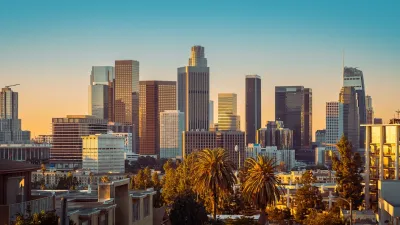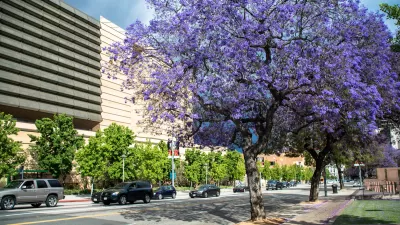Los Angeles organizers work with park professionals on policies to allow green space investment in neighborhoods that have lacked it without paving the way for displacement.

Parks are the backbone of a healthy neighborhood. They’re a space where people can gather, children can connect with and learn about nature, and families can engage in free, health-promoting activities.
But parks have also been historically used as tools for exclusion and racial segregation. The U.S. National Parks System was created specifically to steal land from Indigenous tribes. Seneca Village, one of the few neighborhoods in New York City where Black residents could own property (and therefore be eligible to vote), was demolished to make way for Central Park.
Despite their bucolic image, parks remain contested spaces, and tense encounters about who belongs in them often fall along racial and class lines, sometimes with tragic results. In 2014, Cleveland police shot and killed Tamir Rice, a 12-year-old Black boy who was playing in a park with a toy gun. More recently in New York City, a white woman named Amy Cooper feigned fear and threatened Christian Cooper, a Black bird-watcher who is not related to Amy Cooper, with police intervention after he asked her to leash her dog, per the rules of the park.
For low-income residents in Los Angeles, parks have become racialized symbols of “green gentrification” and displacement, where private yoga classes for wealthy white women are encouraged to take up public space while low-income primarily Latinx park vendors are ticketed and harassed. Green gentrification is a process in which cleaning up pollution or providing green amenities increases local property values and attracts wealthier residents to a previously polluted or disenfranchised neighborhood. This leads to landowners raising rents on the existing residents and businesses, eventually displacing them. Additionally, when higher-income folks move into an area, they often attempt to police the existing low-income residents engaging in activities like food vending or barbecues that—while legal and innocuous—are seen as unacceptable to the newer, wealthier residents.
But what if public parks could instead be reimagined as spaces that welcomed everyone and provided solutions to a broad range of community needs? That’s the vision behind ...
FULL STORY: Keeping Gentrification From Following Green Space

Alabama: Trump Terminates Settlements for Black Communities Harmed By Raw Sewage
Trump deemed the landmark civil rights agreement “illegal DEI and environmental justice policy.”

Study: Maui’s Plan to Convert Vacation Rentals to Long-Term Housing Could Cause Nearly $1 Billion Economic Loss
The plan would reduce visitor accommodation by 25% resulting in 1,900 jobs lost.

Why Should We Subsidize Public Transportation?
Many public transit agencies face financial stress due to rising costs, declining fare revenue, and declining subsidies. Transit advocates must provide a strong business case for increasing public transit funding.

Paris Bike Boom Leads to Steep Drop in Air Pollution
The French city’s air quality has improved dramatically in the past 20 years, coinciding with a growth in cycling.

Why Housing Costs More to Build in California Than in Texas
Hard costs like labor and materials combined with ‘soft’ costs such as permitting make building in the San Francisco Bay Area almost three times as costly as in Texas cities.

San Diego County Sees a Rise in Urban Coyotes
San Diego County experiences a rise in urban coyotes, as sightings become prevalent throughout its urban neighbourhoods and surrounding areas.
Urban Design for Planners 1: Software Tools
This six-course series explores essential urban design concepts using open source software and equips planners with the tools they need to participate fully in the urban design process.
Planning for Universal Design
Learn the tools for implementing Universal Design in planning regulations.
Smith Gee Studio
Alamo Area Metropolitan Planning Organization
City of Santa Clarita
Institute for Housing and Urban Development Studies (IHS)
City of Grandview
Harvard GSD Executive Education
Toledo-Lucas County Plan Commissions
Salt Lake City
NYU Wagner Graduate School of Public Service





























